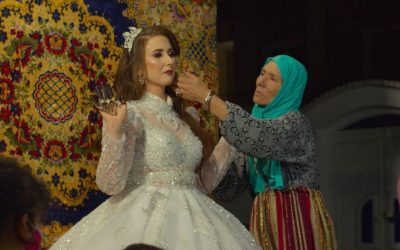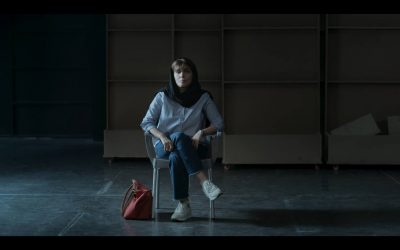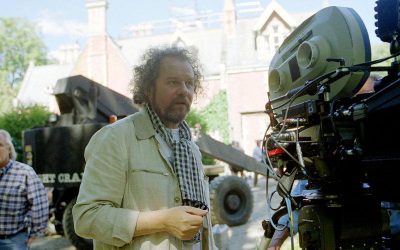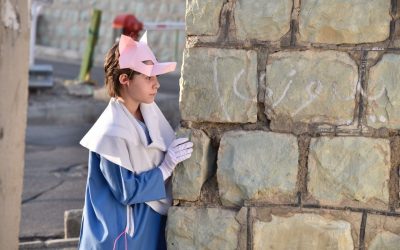Khazar Masoumi, born in 1983 in Tehran, began her undergraduate studies in law at the University of Tehran in 2001. In the winter of 2003, she was introduced to Ebrahim Hatamikia for the role of Arghavan in the film “The Color of Arghavan” and was selected for this role. Shortly after finishing the filming, she accepted a role in the film “Kandolus Gardens” directed by Iraj Karimi. Before leaving Iran in 2008, she acted in the series “A Fistful of Eagle’s plume” directed by Asghar Hashemi and in the film “Shirin” by Abbas Kiarostami. During a fourteen-year hiatus from acting, she pursued her master’s degree in environmental law and her doctorate in international law at the University of Strasbourg, France. In 2021, she played a minor role in the play “Waiting for Godot” directed by Amir Reza Koohestani, and then performed for two years in the play “In Transit,” also by Koohestani, which toured Geneva, Switzerland, France, Spain, and Italy. In this production, she acted in Persian, French, and Portuguese. The play was featured in the main section of the Avignon Festival in the summer of 2022. Since 2017, Khazar Masoumi has been living in São Paulo.
Redcut: How did you decide to act in front of the camera in pursuit of storytelling and filmmaking? You certainly know that during the period when you began your acting career, female actors faced numerous restrictions and severe censorship. How much did structural control over your performance and the freedom to choose roles impact you?
Khazar Masoumi: In my second year of law school, feeling exhausted and bored with the conservatism and traditionalism prevailing in the academic atmosphere, I was also attending art history classes at the Karnameh Institute when I received the opportunity to meet Ebrahim Hatamikia. At that time, he was looking for an actress for the role of Arghavan and had decided to cast a non-professional actress for this role. After an hour or two of conversation, I was selected for the part. Although this decision was unexpected, it fit into my life as if I had been preparing for it for years. Sometimes it feels like just yesterday, but the truth is that our awareness of feminist issues has risen remarkably over the past twenty years. Now at forty, I realize how normalized many restrictions had become for me or how they were portrayed as natural. How much of it I attributed to my own choices, while being in a system that does not recognize your independent identity and is filled with false social contracts, makes individual choice at twenty not very significant. Additionally, “The Color of Arghavan” was banned before its screening at the Fajr Festival in the year it was produced. The ban occurred under severe security pressures and was a result of Ebrahim Hatamikia’s refusal to censor the film, although he publicly took full responsibility for the film’s non-screening as its “spiritual father.” The ban on “The Color of Arghavan” became a turning point for me, as I was supposed to have two films at my first festival. A combination of remaining relatively unknown and the imposition of strictness by a consultant I had trusted at the time led me to think that I was not leaving acting at its peak when I emigrated to continue my studies. It took years for me to realize that my absence from cinema had been noticeable and that there were still people who remembered me.
In summary, censorship penetrates so deeply that you forget there is a boundary between personal and imposed decisions, and ultimately many things are attributed to your personal choices. There is a separate waltz scene in “Kandolus Gardens” where if you’re not careful, you might think I don’t know how to move, while those steps and turns were the absolute limits of movement to ensure that both an image was created and it wouldn’t be subject to censorship. In the series “A Fistful of Eagle’s plume,” my and Hamed Behdad’s roles were dubbed in a way that our continuous contact could be justified. My personal taste was naturally not in these details, which were gradually imposed on us.
Redcut: As an actress, do you prefer to have control over creativity and spontaneity regarding form, movements, and dialogues, or do you consider dependence on the script essential for achieving an accurate film outcome? How do you find the balance between dependence on the script and your individual creativity as an actress?
Khazar Masoumi: Dependence on the script is a priority for me. I believe that my creativity and freedom must find their way within the framework of the script. Of course, the dialogue and interaction between the writer and the actor are important, but the first solution should not be to change the script. Personally, I enjoy the challenge of finding a way to act despite a text that doesn’t initially appeal to me or feels alien. Almost everything can be said and played in different ways. Fidelity to the image the writer has in mind should not be a hindrance for me as an actress, because the mere presence of any actor will inevitably add their mood, atmosphere, color, and signature to the role. However, working with directors who involve the actor in the writing process is very enjoyable. I had this opportunity in two collaborations with Amir Reza Koohestani. Numerous readings and hearing actors’ suggestions greatly help in shaping the character.
Redcut: Given the patriarchal structure and systematic control in Iranian society, what challenges have you faced as an actress? Do you consider staying and continuing in this environment a form of resistance?
Khazar Masoumi: Acting, on the one hand, grants you more privileges compared to other women, while on the other hand, it adds to your limitations. At least in the 2000s, the fear of publishing images without hijab and without adhering to other prevailing restrictions was very dominant. Additionally, the intensely male-dominated environment of cinema minimized women’s presence and reduced the space for protest and reclaiming rights to a very low level. In a society where even violations of women’s bodies are often blamed on them, your behavior as an actress must reach a degree of control to minimize the risk of internal group issues and confrontations with the authorities. Many young and inexperienced actresses, like myself, pulled themselves through the system without social or feminist support, albeit with significant wounds and trauma. I believe that prior to the “Women, Life, Freedom” movement, staying in official cinema was a form of resistance. However, after that, it is no longer the case. While no one is obliged to resist, the boundaries have become so clear that merely being present cannot be considered valuable.
Redcut: In the film “Kandolus Gardens” directed by Iraj Karimi, how did you get to know the director, and what was your experience working with Iraj Karimi, who was one of the important critics of Iranian society?

Khazar Masoumi
Khazar Masoumi: As far as I remember, one of the crew members had seen my photo in the producer’s office for “The Color of Arghavan” and had introduced me to Iraj Karimi based on Ebrahim Hatamikia’s choice. I really wish I could say these things when Iraj Karimi was alive. Now, it would only serve to ease my conscience. But I’m sorry to say that my young age and inexperience, along with the significant experience of collaborating with Ebrahim Hatamikia in my first work, prevented me from fully benefiting from working with Iraj Karimi. At that time, I was still filtering everything through my experience with Hatamikia and was not very flexible towards the outside world. Iraj Karimi, however, never wavered in his good opinion of me. He was a noble and kind-hearted man who left us too soon. My personal taste is that he was an unparalleled critic and an honest director. But when someone passes away early and makes so few films, these words don’t carry much weight. When I was migrating from Iran, I sent him a short text message saying I hoped to return in the coming years and play the role of an old woman in his films. He replied: “Looking forward to collaborating in the roles of old women.” A wish that never came true. He became seriously ill, and I lacked the courage to write to him after so many years of silence during his illness. It’s a regret that has stayed with me until now.
Redcut: Nowadays, if you are offered a role in a film, what are your priorities for accepting the role?
Khazar Masoumi: Struggle and resistance have become parts of my identity as an actress and for many of my colleagues. When you endure such a tremendous storm and sacrifice your comfort and security to stand alongside your grieving compatriots, it becomes part of your identity as an actress. I hope to have the luck to be the voice of the voiceless. I want to act more in the future and play roles that take my breath away, and afterward, I hope to look at them with joy. I wish to see the change that the professional careers of women actors are not short-lived last throughout my life.
Redcut: How do you compare the status of female actors and filmmakers in Iran during the 1980s, a time when censorship, repression, and control over women’s bodies were rampant, and where close-ups of an actor’s face or hands were prohibited, to today’s situation, given that the number of female actors and filmmakers is increasing?
Khazar Masoumi: We have emerged from pits and mud generation by generation, passing this torch to one another. I deeply regret that sometimes this solidarity has been broken, and we have not seen the pain of our predecessors. We are fortunate that they were so magnanimous, and now that it is our turn to suffer, they welcome us with open arms. Every freedom we have gained is undoubtedly the product of societal pressure. However, breaking away from official cinema, even though it has become more open than in the 2000s, seems more necessary than ever. Additionally, what good is it for two centimeters of hair to be visible when women are killed, injured, and deprived of basic rights for refusing mandatory hijab?
Redcut: In acting, the body, movements, and form must be free to allow for creativity and to engage with the audience through imagery and eye contact. How does the mandatory dress code for female actors in Iran complicate a woman’s creativity compared to male actors who face no such restrictions? What complexities arise in performing with a covered body and mandatory hijab?
Khazar Masoumi: The mandatory dress code and the limitations have turned official Iranian cinema into a series of close-up shots. The first time I performed on stage in Europe without the mandatory hijab for the play “In Transit” by Amir Reza Koohestani, I realized how inactive and untrained my body had become. All our acting energy is condensed into focusing on the face and expressions. Many real-life situations like sleeping, bathing, swimming, and affectionate contact between bodies are erased. This results in a poverty of imagination and, consequently, a poverty of acting. There are so many scenes that we have never had the opportunity to create and act out in official cinema. For example, a simple scene of hugging a spouse in the Kandolus Gardens reached extreme abstraction. In a scene where Aban and Kaveh embrace each other, we only see two hands closing as if they are the hands of a tree. In a sweeping censorship act, the state TV erased the images of all actors who, prior to the revolution, did not wear the hijab, thus requiring them to tie their scarves behind their heads according to some unwritten contract. In “The Color of Arghavan,” there’s a scene where Arghavan’s injured father lies across her lap, and security officers come to arrest Arghavan. We see this image from behind Arghavan so that the contact of the father’s head with his daughter’s lap is not displayed. In another scene from the same film, Arghavan waves to a security officer from behind her window at night. Ebrahim Hatamikia wanted to shoot this shot without a scarf, relying on light and darkness, as there was no reason for the girl to wear a scarf in her own home. But ultimately, my hair would have been visible, so they threw a loose scarf over my head. I want to say that even the rigid structure of cinema does not believe in these false rules. It’s a system that forces everyone to play by its deceitful rules, and the audience, for years, accepts these rules like a contract, despite its absurdity. These days, when we watch unlicensed films, it feels like we are discovering what we knew should exist but did not.
Redcut: Do you have a new project in hand? Please tell us a bit about it.
Khazar Masoumi: This year, I am working on writing and rehearsing a monologue (solo) for my performance in Portuguese. It’s a retelling of Shahrazad from “One Thousand and One Nights” if she were living in our time. I hope to bring it to Europe after performing it in Brazil, in versions translated into other languages. I believe revisiting Shahrazad for our era is an important and uplifting experience.











